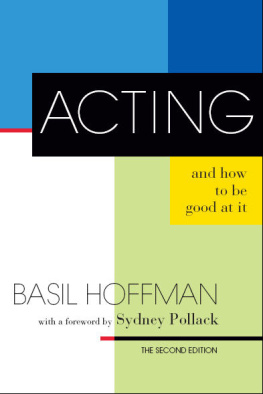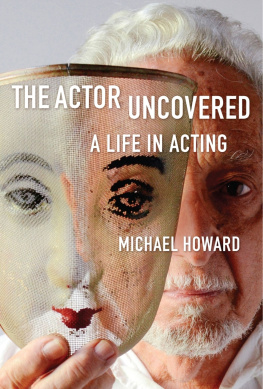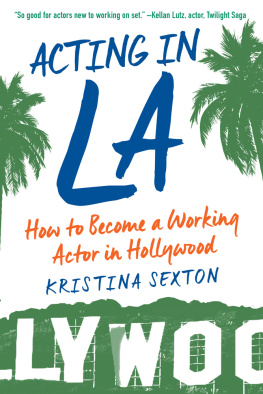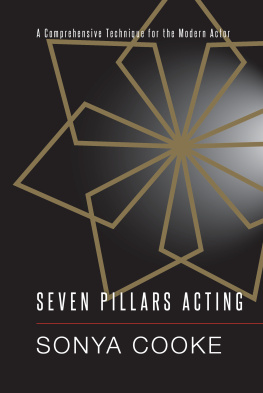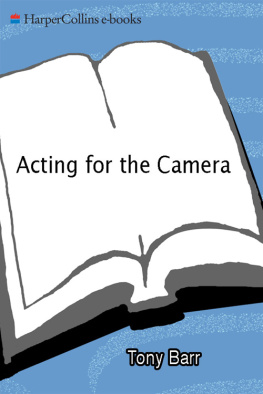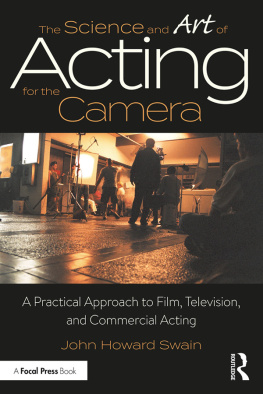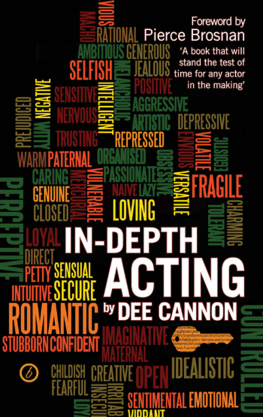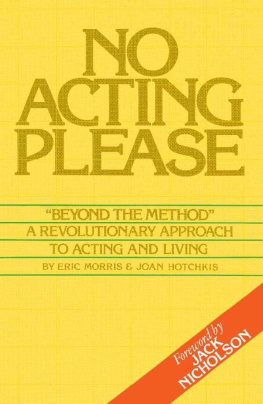
ACTING
AND HOW TO BE GOOD AT IT
THE SECOND EDITION
ACTING
and how to be
good at it
BASIL HOFFMAN

with a foreword by Sydney Pollack
THE SECOND EDITION

Copyright 2008 by Basil Hoffman
All rights reserved
Published by Ingenuity Press USA
No part of this publication may be reproduced, stored in a retrieval system or transmitted in any form or by any means, electronic, mechanical, photocopying, recording, scanning or otherwise, exceptas permitted under Sections 107 or 108 of the 1976 United States Copyright Act, without either the prior written permission of the Publisher, or authorization through payment of the appropriate fees. Requests to the Publisher for permission or fees should be addressed to Permission/Fees Department, Ingenuity Press USA, P.O. Box69822, Los Angeles, California 90069-0822 USA; e-mail link at www. Ingenuity Press USA. com.
This publication is designed to provide accurate and authoritative information in regard to the subject matter covered. It is sold with the understanding that the Publisher is not engaged in rendering career counseling or other professional services.
First edition copyright 2006 by Basil Hoffman
Second edition copyright 2008 by Basil Hoffman
Library of Congress Control Number 2008932347
ISBN 978-0-9715410-2-3
Design by Gopa & Ted2, Inc.
Printed in the United States of America
ALSO BY BASIL HOFFMAN
Cold Reading and How to Be Good at It
DEDICATION 
CHRISTINE, to whom I was married for more than 17 years, was an indispensable partner to me in every aspect of my life. Her love, her unwavering support, her gentle (but always honest) criticism, the high standards she set for herself, and her grace (and beauty) enriched me personally and professionally in many, many ways, and I am very grateful. Her unfailingly joyous, uplifting encouragement (and, often, financial help) to others, even at times of her own sometimes extreme personal difficulty, was a wonder to behold. She was the most selfless and courageous person I have ever known.
Besides Christines indescribable positive impact on my life in general, her keen sense of truthfulness and good taste kept me on track every step of the way in the creation of this (and my previous) volume. Without her influence, neither book would have been written.
My gratitude to Christine is greater than I ever told her and greater than I can express here. Nevertheless, I am dedicating Acting and How to Be Good at It to her memory as my best attempt at sufficient thanks.
I will never forget.
CONTENTS 
What are the differences between audition, rehearsal
and performance acting?
Is classical acting different from acting in more
contemporary works?
What are the most important attributes for someone
who wants an acting career?
Can an actor be permanently harmed by destructive
teachers and teaching methods?
What is the difference between teaching and coaching,
and are teachers and coaches the same people?
What is Subjective Situation Perception, and why do
I need to know about it?
What are stage directions and narrative, and are they
important to an actors performance?
What is a character?s ?essence,? and why is it important
for me to identify it?
Does the character?s essence contain elements of the
actor?s essence?
What is the difference between playing an attitude
and playing a character, and are attitude and essence
the same thing?
What does ?living in the moment? mean, and what is
its importance?
Why are the differences between what and how
so important?
Is there a difference between demonstrating and
indicating?
How important is the element of surprise, and how
can I get that into my performance?
What is memory of emotion, and what does it have
to do with the actors comfort zone?
Is there some technical way to express the meanings
of the words?
Can you explain the meaning and the importance
of conflict?
What is the tone of a script, and how should that
affect my approach to the work?
What is the difference between naturalism
and truthfulness?
When you discuss purpose, do you really mean
objective?
Why is listening so important? Is there some
special way to listen?
What does the word compass mean when you
use it in discussing a role or performance?
What are the two fundamental truths about every
script?
What is type casting, and how does it affect an actors
employability?
How do I approach the part if there are only a few
lines of dialogue?
Isnt the concept of getting it fast necessarily
superficial, and why is it so difficult for actors to be
truthful with only a small amount of preparation?
How do you characterize the relationship between
the actor and the writer?
How important is an actors attitude in the workplace,
and what constitutes a positive attitude?
Should I approach every script in the same way,
and are there guidelines to follow?
What do you mean when you say, Break down
the script to energize it?
When is it appropriate to ask questions about
the work, and how do I know whom to ask?
In film and television, does an actor have to give
the same performance in every take?
What does a director mean when he says, Make it
bigger?
What does a director mean when he says, Bring it
down or Its over the top?
If Im directed to do the scene faster or slower or
bigger or smaller or louder or quieter, how can I
make that quick adjustment without being artificial?
Will the director ever direct me in a language I dont
understand, and is there a reliable way to deal with
that situation?
Is the stage director always in charge of final
creative decisions?
Is the movie director always in charge of final
creative decisions?
Is the television director always in charge of final
creative decisions?
What should I do if the other actors arent good,
are unprepared or misbehave in some way?
How do you work on a part you have been hired
to play but didnt audition for?
How much input is an actor allowed to have when it
comes to things like props and wardrobe?
Should the actor deal directly with the cinematographer,
and how can that affect his performance?
What effect does the film editor have on an actor?s
performance, and does the actor have direct contact
with the editor?
Do commercials make demands on the actor that are
different from the demands of stage and screen work?
What necessities should an actor acquire
as he pursues a career?
Are there any guidelines for starting and maintaining
an acting career?
Can one negative professional experience damage my
career?
Are there any special industry information sources
that I should know about?
FOREWORD 
BASIL HOFFMAN writes about acting from the inside of the craft in a practical, clear way, without mumbo-jumbo or mystique. He knows what hes writing about, and you can feel his years of experience on the pages of this book.
Next page
